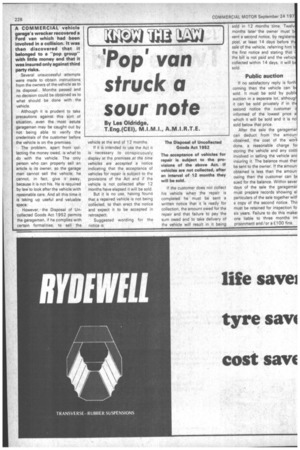Pop van struck a sour note
Page 230

If you've noticed an error in this article please click here to report it so we can fix it.
By Les Oldridge, T.Eng.(CEI), M.I.M.I., A.M.I.R.T.E.
A COMMERCIAL vehicle garage's wrecker recovered a Ford van which had been involved in a collision.. It was then discovered that it belonged to a "pop group" with little money and that it was insured only against third party risks.
Several unsuccessful attempts were made to obtain instructions from the owners of the vehicle as to its disposal.. Months passed and no decision could be obtained as to what should be done with the vehicle.
Although it is prudent to take precautions against this sort of situation, even the most astute garageman may be caught out by not being able to verify the credentials of the customer before the vehicle is on the premises.
The problem, apart from collecting the money owed, is what to do with the vehicle. The only person who can properly sell an article is its owner, so the garage man cannot sell the vehicle; he cannot, in fact, give it away, because it is not his He is required by law to look after the vehicle with reasonable care. And all this time it is taking up useful and valuable space.
However, the Disposal of Uncollected Goods Act 1952 permits the garageman, if he complies with certain formalities, to sell the vehicle at the end of 12 months.
If it is intended to use the Act it is necessary to conspicuously. display at the premises at the time vehicles are accepted a notice indicating that the acceptance of vehicles for repair is subject to the provisions of the Act and if the vehicle is not collected after 12 months have elapsed it will be sold.
But it is no use, having found that, a repaired vehicle is not being collected, to then erect the notice and expect it to be accepted in retrospect.
Suggested wording for the notice is:
The Disposal of Uncollected Goods Act 1952
The acceptance of vehicles for repair is subject to the provisions of the above Act. If vehicles are not collected, after an interval of 12 months they will be sold.
If the customer does not collect his vehicle when the repair is completed he must be sent a written notice that it is ready for collection, the amount owed for the repair and that failure to pay the sum owed and to take delivery of the vehicle will result in it being
sold in 12 months time. Twelv months later the owner must b -sent a second notice, by registere post, at least 14 days before th sale of the vehicle, referring him t the first notice and stating that the bill is not paid and the vehicle collected within 14 days, it will be sold.
Public auction If no satisfactory reply is forth coming then the vehicle can be sold. It must be sold by public auction in a separate lot, althoug it can be sold privately if in the second notice the customer it informed of the lowest price a which it will be sold and it is no sold below that price.
After the sale the garagema can deduct from the amoun obtained, the cost of the work done, a reasonable charge foe storing the vehicle and any costE involved in selling the vehicle anc insuring it. The balance must ther be sent to the owner. If the amoun. obtained is less than the amoun. owing then the customer can be sued for the balance. Within sever days of the sale the garagemar must prepare records showing al particulars of the sale together witla copy of the second notice. Thi; must be retained for inspection fo six years. Failure to do this makel one liable to three months im prisonment and /or a £100 fine.




































































































































































































































































































































































